__The Robert F. Sibert Medal__
 The Sibert Award and Honor Awards are presented to the authors of the most distinguished informational children's books published the previous year.
Award Terms:
The Sibert Award and Honor Awards are presented to the authors of the most distinguished informational children's books published the previous year.
Award Terms:
- Excellent, engaging, and distinctive use of language.
- Excellent, engaging, and distinctive visual presentation.
- Appropriate organization and documentation.
- Clear, accurate, and stimulating presentation of facts, concepts, and ideas.
- Appropriate style of presentation for subject and for intended audience.
- Supportive features (index, table of contents, maps, timelines, etc).
- Respectful and of interest to children.
 My Season with Penguins
By Sophie Webb
2001 Honor Book
My season with Penguins is a compilation of an artists journey. Sophie Webb travels to the cold climate plain of Antartica. Throughout her two-month stay she observes, records and draws her new found animal friends.
My Season with Penguins
By Sophie Webb
2001 Honor Book
My season with Penguins is a compilation of an artists journey. Sophie Webb travels to the cold climate plain of Antartica. Throughout her two-month stay she observes, records and draws her new found animal friends.
 The Brooklyn Bridge
By Lynn Curlee
2002 Honor Book
Brooklyn Bridge provides detailed information on the process of how the Brooklyn Bridge was built. A fourteen-year project now stands as on of the most popular world landmarks.
The Brooklyn Bridge
By Lynn Curlee
2002 Honor Book
Brooklyn Bridge provides detailed information on the process of how the Brooklyn Bridge was built. A fourteen-year project now stands as on of the most popular world landmarks.
 Hole in My Life
By Jack Gantos
2003 Honor Book
Hole in My Life
By Jack Gantos
2003 Honor BookAfter being imprisoned at a young age, Jack Gantos re-tells his story of how he turned his life around and became the man he is today.
 To Dance: A Ballerina's Graphic Novel
By Siena Cherson Siegel
2007 Honor Book
To Dance: A Ballerina's Graphic Novel
By Siena Cherson Siegel
2007 Honor BookThis is a story of Siena Siegel, her dream of becoming a prima ballerina, and how she overcame her obstacles to make her dream a reality.
 What to Do About Alice
By Barbra Kerley
2009 Medal Winner
This is an entertaining bibliography about Alice, President Theodore Rooesevelts daughter and their chaotic life in the WHite House.
What to Do About Alice
By Barbra Kerley
2009 Medal Winner
This is an entertaining bibliography about Alice, President Theodore Rooesevelts daughter and their chaotic life in the WHite House.
 Team Moon: How 400,000 People Landed Apollo 11 on the Moon
By Catherine Thimmesh
2007 Medal Winner
This is an in depth behind the scenes look into the first Apollo moon landing, from the first ideas to the final landing.
Team Moon: How 400,000 People Landed Apollo 11 on the Moon
By Catherine Thimmesh
2007 Medal Winner
This is an in depth behind the scenes look into the first Apollo moon landing, from the first ideas to the final landing.
 Sequoyah
By James Rumford
2005 Honor Book
In 1958 a crippled Sequoyah struggles to create the Cherokee writing system.
Sequoyah
By James Rumford
2005 Honor Book
In 1958 a crippled Sequoyah struggles to create the Cherokee writing system.
 The Tarantula Scientist
By Sy Montogomery
2005 Honor Book
This is a documentary of Sam Marshall's research and findings, dealing with the tarantula.
The Tarantula Scientist
By Sy Montogomery
2005 Honor Book
This is a documentary of Sam Marshall's research and findings, dealing with the tarantula.
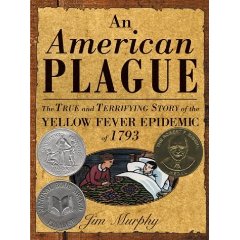 An American Plague: The True and Terrifying Story of the Yellow Fever Epidemic of 1793
By Jim Murphy
2004 Medal Winner
Yellow Fever epidemic in 1793 was a deadly outbreak of influenza in Philadelphia that killed thousands of people, and forced President Washington to flee the city in its time of need.
An American Plague: The True and Terrifying Story of the Yellow Fever Epidemic of 1793
By Jim Murphy
2004 Medal Winner
Yellow Fever epidemic in 1793 was a deadly outbreak of influenza in Philadelphia that killed thousands of people, and forced President Washington to flee the city in its time of need.
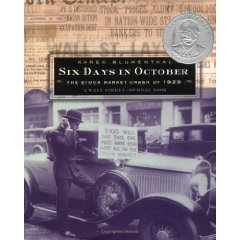 Six Days in October: The Stock Market Crash of 1929
By Karen Blumenthal
2003 Honor Book
A compilation of stories from people who seen the effects of Black Tuesday and the Crash of '29.
Six Days in October: The Stock Market Crash of 1929
By Karen Blumenthal
2003 Honor Book
A compilation of stories from people who seen the effects of Black Tuesday and the Crash of '29.
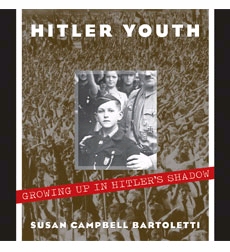 Hitler Youth: Growing up in Hitler's Shadow
By Susan Campbell Bartoletti
2006 Honor Book
The recounting of growing up in Nazi-Germany, and the excitement and fury surrounding the notorious Hitler Youth. It explores the memories of those who lived during the Third Reich's rise to power and its ultimate demise.
Hitler Youth: Growing up in Hitler's Shadow
By Susan Campbell Bartoletti
2006 Honor Book
The recounting of growing up in Nazi-Germany, and the excitement and fury surrounding the notorious Hitler Youth. It explores the memories of those who lived during the Third Reich's rise to power and its ultimate demise.
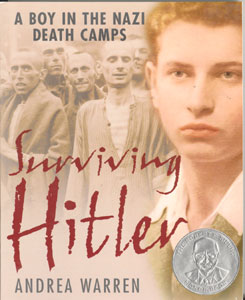 Surviving Hitler: A Boy in the Nazi Death Camps
By Andrea Warren
2002 Honor Book
Jack recounts surviving Hitler's rise to power and the horrible atrocities of the death camps.
Surviving Hitler: A Boy in the Nazi Death Camps
By Andrea Warren
2002 Honor Book
Jack recounts surviving Hitler's rise to power and the horrible atrocities of the death camps.
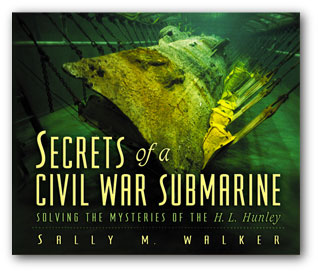 Secrets of a Civil War Submarine: Solving the Mysteries of the H.L. Hunley
By Sally M. Walker
2008 Medal Winner
A scientific and historic exploration of the Civil War submarine H.L. Hunley, the first sub to destroy an enemy ship, and also the search and reclamation of the Hunley after its discovery in Charleston Bay in 1995.
Secrets of a Civil War Submarine: Solving the Mysteries of the H.L. Hunley
By Sally M. Walker
2008 Medal Winner
A scientific and historic exploration of the Civil War submarine H.L. Hunley, the first sub to destroy an enemy ship, and also the search and reclamation of the Hunley after its discovery in Charleston Bay in 1995.
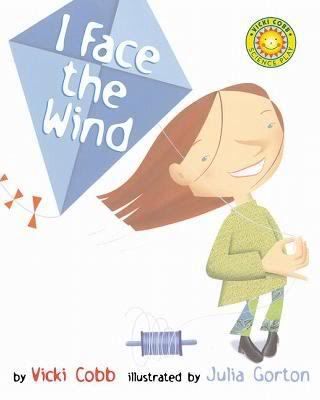 I Face The Wind
By Vicki Cobb
2004 Honor Book
I Face The Wind
By Vicki Cobb
2004 Honor BookThis book introduces the wind, how it works and functions, through a series of hands-on activities it teaches how to understand something you cannot see.
 The Wall: Growing Up behind the Iron Curtain
by Peter Sís
2008 Medal Winner
A young Czechoslovakian boy must creatively express himself in order to deal with the chaos of the Cold war.
The Wall: Growing Up behind the Iron Curtain
by Peter Sís
2008 Medal Winner
A young Czechoslovakian boy must creatively express himself in order to deal with the chaos of the Cold war.
 Pedro and Me: Friendship, Loss and What I Learned
By Judd Winick
2001 Honor Book
Pedro and Me is a tale about a young man's journey to bring health awareness to young people.
Pedro and Me: Friendship, Loss and What I Learned
By Judd Winick
2001 Honor Book
Pedro and Me is a tale about a young man's journey to bring health awareness to young people.
 Blizzard! The Storm That Changed America
By Jim Murphy
2001 Honor Book
A strong storm hits the Northeastern States of the U.S. unexpectedly in the late 1800's.
Blizzard! The Storm That Changed America
By Jim Murphy
2001 Honor Book
A strong storm hits the Northeastern States of the U.S. unexpectedly in the late 1800's.
 The Longitude Prize
By Joan Dash
2001 Honor Book
A prize is offered for a simple and practical device that could determine longitude to the sailors in the early 1700's.
The Longitude Prize
By Joan Dash
2001 Honor Book
A prize is offered for a simple and practical device that could determine longitude to the sailors in the early 1700's.
 Sir Walter Ralegh and the Quest for El Dorado
By Marc Aronson
2001 Medal Winner
This award winning book covers Sir Walter Ralegh's biography and his quest to find the mythological city of El Dorado.
Sir Walter Ralegh and the Quest for El Dorado
By Marc Aronson
2001 Medal Winner
This award winning book covers Sir Walter Ralegh's biography and his quest to find the mythological city of El Dorado.
 Vincent Van Gogh: Portrait of an Artist
By Jan Greenberg and Sandra Jordan
2002 Honor Book
Vincent Van Gogh had a hard time living up to his families expectations. By being an outcast, it gave him the drive and passion to paint masterpieces
Vincent Van Gogh: Portrait of an Artist
By Jan Greenberg and Sandra Jordan
2002 Honor Book
Vincent Van Gogh had a hard time living up to his families expectations. By being an outcast, it gave him the drive and passion to paint masterpieces
 When Marian Sang
By Pam Muñoz
2003 Honor Book
Marian must break down the walls of racism by using, the only weapon she has, her voice.
When Marian Sang
By Pam Muñoz
2003 Honor Book
Marian must break down the walls of racism by using, the only weapon she has, her voice.
 Action Jackson
By Jan Greenberg and Sandra Jordan
2003 Honor Book
Jackson Pollock changed the way an artist approached a canvas.
Action Jackson
By Jan Greenberg and Sandra Jordan
2003 Honor Book
Jackson Pollock changed the way an artist approached a canvas.
 Walt Whitman: Words for America
By Barbara Kerley
2005 Honor Book
Walt Whitman, a proud American writer, does his part to honor the voice of America and its president, Abraham LIncoln, during the Civil War and time immediately following.
Walt Whitman: Words for America
By Barbara Kerley
2005 Honor Book
Walt Whitman, a proud American writer, does his part to honor the voice of America and its president, Abraham LIncoln, during the Civil War and time immediately following.
 The Voice That Challenged a Nation: Marian Anderson and the Struggle for Equal Rights
By Russel Freedman
2005 Medal Winner
Marian Anderson, an African American woman, explains in this documentary the hardships she faced while acheiving her goal to become a professional singer.
The Voice That Challenged a Nation: Marian Anderson and the Struggle for Equal Rights
By Russel Freedman
2005 Medal Winner
Marian Anderson, an African American woman, explains in this documentary the hardships she faced while acheiving her goal to become a professional singer.
 Quest for the Tree Kangaroo: An Expedition to the Cloud Forest of New Guinea
By Sy Montgomery
2007 Honor Book
Scientist Lisa Dabek studies the rare Matschie's tree kangaroo in the tall trees of the Papua New Guinea rainforest.
Quest for the Tree Kangaroo: An Expedition to the Cloud Forest of New Guinea
By Sy Montgomery
2007 Honor Book
Scientist Lisa Dabek studies the rare Matschie's tree kangaroo in the tall trees of the Papua New Guinea rainforest.
 Freedom Riders: John Lewis and Jim Zwerg on the Front Lines of the Civil Rights Movement</em
By Ann Bausum
2007 Honor Book
John Lewis and Jim Zwerg, a black and white man, make a stand against racism during the 1960's civil rights movement.
Freedom Riders: John Lewis and Jim Zwerg on the Front Lines of the Civil Rights Movement</em
By Ann Bausum
2007 Honor Book
John Lewis and Jim Zwerg, a black and white man, make a stand against racism during the 1960's civil rights movement.
 Spiders
By Nic Bishop
2008 Honor Book
An interesting picture and fact filled book about the different types of spiders.
Spiders
By Nic Bishop
2008 Honor Book
An interesting picture and fact filled book about the different types of spiders.
 Lightship
By Brian Floca
2008 Honor Book
A journey through the ships that guide the way on the ocean for larger ships is explained in this factual, yet picturual book.
Lightship
By Brian Floca
2008 Honor Book
A journey through the ships that guide the way on the ocean for larger ships is explained in this factual, yet picturual book.
 Bodies from the Ice: Melting Glaciers and the Recovery of the Past
By James M. Deem
2009 Honor Book
The worlds glaciers have been rapidly melting. As the glaciers are forming slushy ice water, hidden treasures from the past are being revealed.
Bodies from the Ice: Melting Glaciers and the Recovery of the Past
By James M. Deem
2009 Honor Book
The worlds glaciers have been rapidly melting. As the glaciers are forming slushy ice water, hidden treasures from the past are being revealed.
 We Are the Ship: The Story of Negro League Baseball
By Kadir Nelson
2009 Medal Winner
Segregation forced African Americans to play baseball in a separate league. With self control and determination, Jackie Robinson gave African Americans a chance to finally be able to play professional baseball.
We Are the Ship: The Story of Negro League Baseball
By Kadir Nelson
2009 Medal Winner
Segregation forced African Americans to play baseball in a separate league. With self control and determination, Jackie Robinson gave African Americans a chance to finally be able to play professional baseball.
 Almost Astronauts: 13 Women Who Dared to Dream
By Tanya Lee Stone
2010 Medal Winner
13 women dreamed to fly to the moon and now as they watched one of their own shooting into space they realized their dream was now a reality.
Almost Astronauts: 13 Women Who Dared to Dream
By Tanya Lee Stone
2010 Medal Winner
13 women dreamed to fly to the moon and now as they watched one of their own shooting into space they realized their dream was now a reality.
 The Day-Glo Brothers: The True Story of Bob and Joe Switzer's Bright Ideas and Brand New Colors
By Chris Barton
2010 Honor Book
Joe Switzer wanted to make his magic act better. With the help of his brother Bob, they created a fluorescent paint that is used on signs and store windows.
The Day-Glo Brothers: The True Story of Bob and Joe Switzer's Bright Ideas and Brand New Colors
By Chris Barton
2010 Honor Book
Joe Switzer wanted to make his magic act better. With the help of his brother Bob, they created a fluorescent paint that is used on signs and store windows.
 Moonshot: The Flight of Apollo 11
By Brian Floca
2010 Honor Book
Apollo 13 was an important space shuttle launch. In this exciting book, the reader will encounter a first hand look into the spacecrafts flight.
Moonshot: The Flight of Apollo 11
By Brian Floca
2010 Honor Book
Apollo 13 was an important space shuttle launch. In this exciting book, the reader will encounter a first hand look into the spacecrafts flight.
 Claudette Colvin: Twice Toward Justice
By Phillip Hoose
2010 Honor Book
Claudette Colvin, a black teen during the civil rights movement, must face the racial prejudice of her time and overcome obstacles to stand up for what she believes in.
Claudette Colvin: Twice Toward Justice
By Phillip Hoose
2010 Honor Book
Claudette Colvin, a black teen during the civil rights movement, must face the racial prejudice of her time and overcome obstacles to stand up for what she believes in.
 The Life and Death of Adolf Hitler
By James Cross Giblin
2003 Medal Winner
A historical view of the life surrounding Adolf Hitler and the vivid events that shaped the man known today for his violent actions preceding World War II.
The Life and Death of Adolf Hitler
By James Cross Giblin
2003 Medal Winner
A historical view of the life surrounding Adolf Hitler and the vivid events that shaped the man known today for his violent actions preceding World War II. | I | Attachment | Action | Size | Date | Who | Comment |
|---|---|---|---|---|---|---|
| |
What_to_Do_About_Alice.jpg | manage | 62.8 K | 2009-12-03 - 00:26 | UnknownUser |
Ideas, requests, problems regarding CSUSB Community Wiki? Send feedback



